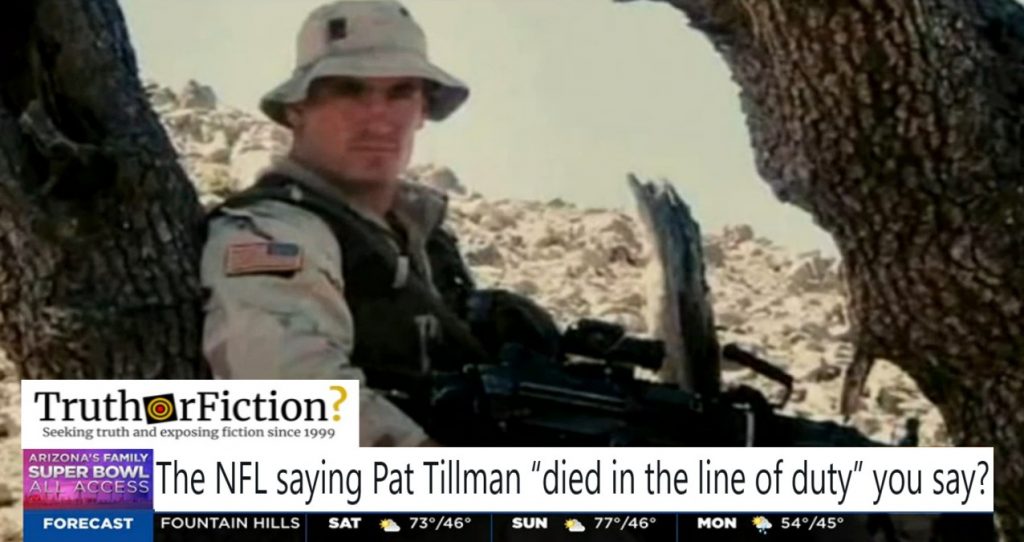Before Super Bowl LVII even began, the National Football League (NFL) drew criticism for distorting the circumstances behind the death of former player and U.S. Army Ranger Pat Tillman in a promotional effort.
The telecast featured a video package on Tillman narrated by actor Kevin Costner, saying:
Fact Check
Claim: The NFL distorted the circumstances behind Pat Tillman’s death in a promotional effort for Super Bowl LVII
Description: The National Football League (NFL) featured a video package on former player and U.S. Army Ranger Pat Tillman during the Super Bowl LVII. However, this promotional effort drew criticism as it was found distorting the circumstances behind Tillman’s death. Tillman, instead of dying in line of duty while protecting his platoon members from attacking Taliban forces as initially reported, he was killed by fire from his platoon due to “gross negligence.”
A day after 9/11, Pat Tillman knew he could do more. He gave up his NFL career to join the U.S. Army Rangers and ultimately lost his life in the line of duty.
That lack of acknowledgement was not lost on social media users watching the event:
It is true that Tillman, who played for the Arizona Cardinals, joined the military in the aftermath of the 9/11 attacks against the United States. However, as The Intercept reported in 2017, Tillman expected to be deployed to Afghanistan to be part of the pursuit of Osama bin Laden, but was instead sent to Iraq in 2002 — an assignment he resented:
Shortly after arriving in the country, he confided in his brother and their friend Russell Baer that he thought the invasion and occupation were “fucking illegal.” He had loose plans to meet with Massachusetts Institute of Technology linguist and antiwar intellectual Noam Chomsky once he got out of the military. Still, as much as Tillman resented the Bush administration’s war of aggression, he refused to walk away from the military until his commitments were met, even after conversations between the NFL and the Defense Department presented an opportunity to do so.
Tillman was indeed killed in action in Afghanistan in April 2004 and awarded a posthumous Silver Star. Initial reports of his death said that he was killed protecting his platoon members from attacking Taliban forces. But in reality he was killed by fire from his platoon that investigators labeled an act of “gross negligence.”
But the details behind his death were not uncovered until five weeks after Tillman’s funeral. The Associated Press reported in May 2004 that Lt. Gen. Stanley McChrystal approved the Silver Star award and a posthumous promotion for Tillman despite suspecting that he was killed by his fellow troops:
The Pentagon’s acting inspector general found that McChrystal should be held “accountable for the inaccurate and misleading assertions” in the Silver Star award recommendation; and for failing to notify the officials processing the award that friendly fire was likely.
Investigators also found that Gen. John P. Abizaid, head of U.S. Central Command at the time, also knew the real cause of Tillman’s death prior to the memorial service for him. According to a May 2005 story in the Washington Post:
The family learned about Tillman’s fratricide over Memorial Day weekend, several weeks later. Commanders felt they could not hold on to the old version because the Rangers were returning home and “everybody knows the story,” the documents show.
Tillman’s death and the disinformation campaign that followed it were the subject of a House Committee on Oversight and Government Reform hearing in April 2007, during which a member of his platoon, Army Spc. Bryan O’Neal, testified that he was ordered not to tell Tillman’s brother and fellow service member, Kevin Tillman, what had happened.
In his own testimony, Kevin Tillman raised the point that his brother’s uniform, journal, and personal effects were burned following his death, and that the unidentified U.S. soldier who killed his brother shot at him despite seeing his arms waving — a violation of the rules of engagement.
Kevin Tillman testified:
These are deliberate and calculated lies.
Writing a Silver Star award before a single eyewitness account is taken is not a misstep. Falsifying soldier witness statements for a Silver Star is not a misstep.
These are intentional falsehoods that meet the legal definition for fraud.
Delivering false information at a nationally televised memorial service is not an error in judgment. Discarding an investigation that does not fit a preordained conclusion is not an error in judgment.
These are deliberate acts of deceit.
This is not the perception of concealment. This is concealment.
A document published by the Oversight Committee in May 2008 stated:
On the key issue of what senior officials knew, the investigation was frustrated by a near universal lack of recall. The Committee interviewed several senior officials at the White House, including Communications Director Dan Bartlett, Press Secretary Scott McClellan, and chief speechwriter Michael Gerson. Not a single one could recall when he learned about the fratricide or what he did in response.
In June 2009 McChrystal said before the Senate Armed Services Committee, “We failed the family. And I was a part of that, and I apologize for it.”
The NFL did not just invoke Tillman by name leading up to the Super Bowl; four U.S. veterans who received scholarships through the foundation named in his honor served as “honorary captains” for the coin toss preceding the game:
- Tillman Scholars Selected as Honorary Super Bowl Coin Toss Captains
- The NFL, The Military, and the Hijacking of Pat Tillman's Story
- Soldier: 'Ordered Not to Tell' of Tillman's Death
- Army Withheld Details About Tillman's Death
- General Suspected Cause of Tillman Death
- Deliberate Acts of Deceit
- Gen. McChrystal's Credibility Problem

